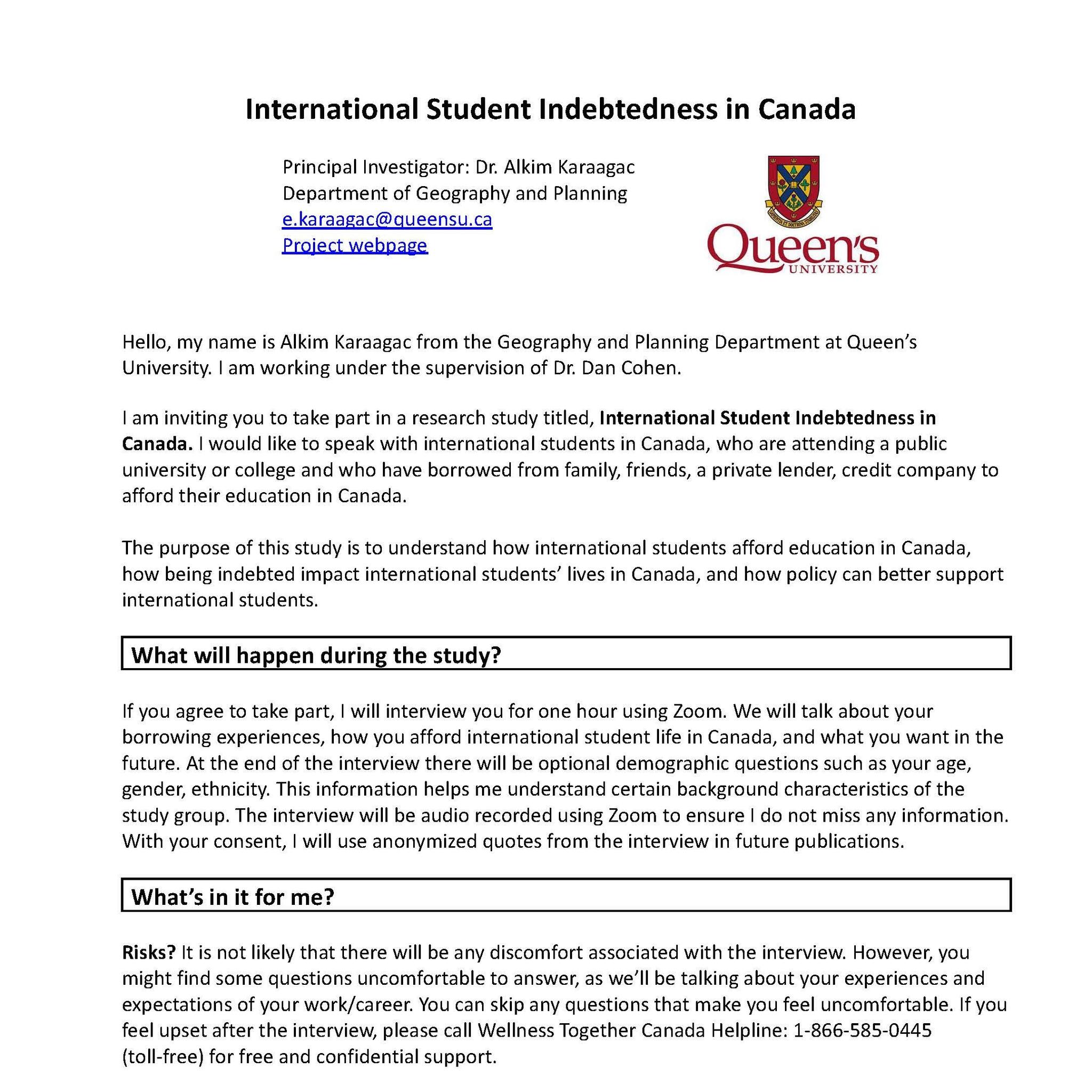.png)
Principal Investigator: Dr. Alkim Karaagac
Department of Geography and Planning, Queen's University
email: e.karaagac@queensu.ca
Supervisor: Dr. Dan Cohen
Department of Geography and Planning, Queen's University
email: dan.cohen@queensu.ca
Get Involved
Are you an International Student in Canada, attending a public university/college?
Have you borrowed from family, friends, or private lenders, to cover your study expenses?
You are invited to participate in this research study, to share your experiences of borrowing, indebtedness and getting by in Canada. I would like to speak with international students who have borrowed from family, friends, a private lender, and/or credit company to afford their education in Canada. The purpose of this study is to understand how international students afford education in Canada, how being indebted impacts international students’ lives in Canada, and how policy can better support international students
You will participate in a 1-hour Zoom interview and will receive a $25 Tim Hortons gift card for participating. I will keep your identity confidential, your name will not be connected to the data in any way.
Please contact me at e.karaagac@queensu.ca for further questions and leave your email to get involved.
Or use the link below to leave your email. I will contact you to schedule an interview.
What is this research about?
International students contribute over $22B per year to Canada’s economy, pay four times more in tuition fees as compared to domestic students, and are responsible for almost 40 percent of all tuition fees paid across Canada. Immigration, Refugees and Citizenship Canada (IRCC) expects international students to be able to finance their studies in Canada on their own. The majority of financial aid options, grants and scholarships at Canadian universities are aimed at Canadian (domestic) students, meaning international students have limited resources available to them. While international tuition fees keep rising, a private (and unregulated) student loans market, targeted toward international students, is expanding.
International students pursue higher education in Canada with incurring debts and having fewer rights and opportunities than students with Canadian citizenship. However, the stereotypical understanding of international student subjects as wealthy, advantaged individuals leads to international students, who are increasingly coming from underprivileged and marginalized backgrounds, to become invisible in academic and public conversations. At the background of this invisibility lie precarity, financial hardship, and indebtedness. Despite the growing impacts of private finance on international students’ lives, there is limited research on the mechanisms, actors and relations of finance in international higher education and the lived experiences of indebtedness among international students.
The aim of this research is to understand the volume, actors and relations of private finance in the international higher education system and the lived experiences of indebtedness among international students.
The research has two lanes of inquiry: (1) Policy and Market research and (2) Narrative Inquiry on students’ experiences of indebtedness. I will conduct in-depth interviews to capture personal accounts of indebted students who borrow from specialized lenders. Through a critical and relational-feminist approach and an intersectional lens, I will analyze how private finance in international higher education operates and shapes the lives of students with respect to gender, race and class.
The outputs of this research will illuminate the social impacts of predatory lending on international students and mobilize knowledge on the wider trend of private financial markets profiting from higher education. Practically, the research will build an evidence base on international student indebtedness to inform policymakers and advocacy groups.
This research is funded through a Queen's University Research Opportunities Postdoctoral Fund (QROF).
This study has been reviewed for ethical compliance by the Queen’s University General Research Ethics Board (GREB).
Queen’s University is situated on the territory of the Haudenosaunee and Anishinaabek. As an employee of Queen's, I am an uninvited guest upon these traditional territories, and I am grateful to be able to work, learn and play on these lands.

